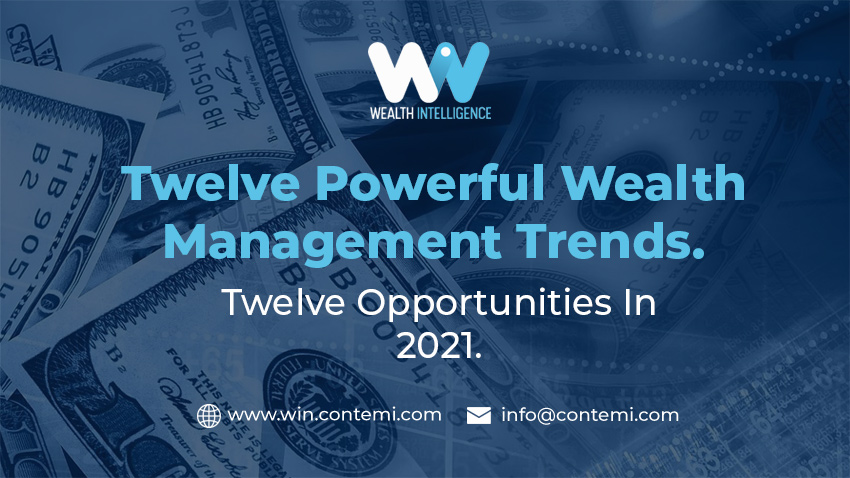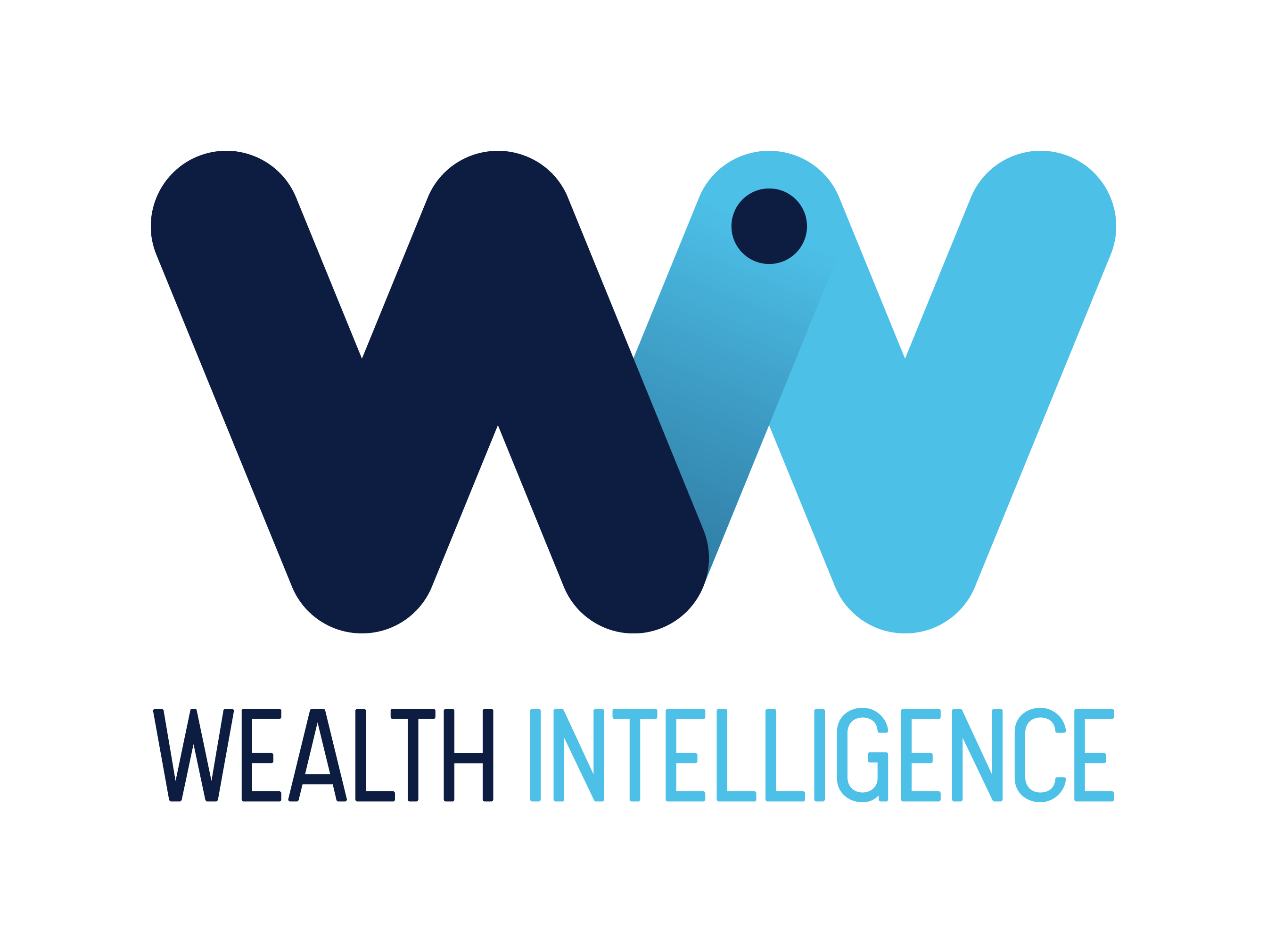
Twelve Powerful Wealth Management Trends. Twelve Opportunities In 2021. Are You Ready?
After a turbulent year businesses are looking for some bulletproof guidance and inspiration, wealth management is no exception.
There is no doubt that the Covid-19 has changed the world for ever, but let’s not make the pandemic a scapegoat for the woes of asset and wealth management organisations. Prior to the pandemic, the wealth management sector was facing multifaceted challenges arising from the digital disruption, evolving customer segments, and shifting competitive dynamics. The pandemic has merely acted as a reminder for the industry to revisit its priorities to appropriately tackle these challenges, and it has been successful in doing so by accelerating the adoption of tech and opening the door for WealthTech.
What Now?
Contemi brings 12 carefully curated trends for wealth managers to refine their strategy and supercharge planning to recover from the pandemic and thrive in the new normal. Each trend presents a powerful opportunity to build new service delivery models, differentiate offerings, communication strategies, campaigns, and more that customers will benefit from and demand.
- Paperless Onboarding
- Self-Service
- Hybrid Advice
- Next-Gen Reporting
- Hyper Personalisation
- Agile & Transformation Culture
- Legacy Retirement
- Impact Investing
- The Great Wealth Transfer
- Partnership & Ecosystem
- Be Different with Digital & Social
- Doing the Core Right
1. Paperless Onboarding
Offer digital-first onboarding.
Client onboarding in wealth management has been a major challenge for a long time- typically taking weeks and months to onboard a single client with paper based, manual processes. With offices closed, face-to-face meetings disrupted, and front office teams no longer co-located due to the pandemic, it has become mission critical for wealth managers to reduce friction, gain a truly digital “360-degree Client View” and ensure business continuity, through digital onboarding.
To make onboarding frictionless firms are now heavily investing in end-to-end automation of client onboarding: from prospecting to identity verification, KYC, AML and due diligence checks, automated data capture, document archival and digital signature with enhanced accuracy and security.
💡 How can you build customer goodwill right from the start?
2. Self-Service
Give clients more power.
The personal connection between advisor and client has always been of key strategic importance to wealth management firms. Fast forward to the present day and the only real change that we have noticed is the demand for enhanced service levels, greater transparency and intuitive tools for a truly simplified, tailored client experience.
Today, wealth managers have customers from different generations, and each one of them is different in their own way. Whilst the one-on-one relationship is still incredibly important; most clients want fast and convenient self-service options via the digital devices of their choice and may judge firms on the sophistication and elegance of their customer interactions.
Therefore, it becomes imperative for firms to accommodate their choices. Wealth managers can leverage technology to be able to deliver a seamless omnichannel experience and create loyalty and engagement.
💡 Want to increase the level of customer satisfaction in your services?
3. Hybrid Advice
Create human plus digital advice models.
The pandemic and subsequent market volatility have shifted investors’ perceptions towards investment advice, with many now placing more importance on a digital experience that also retains human advice. A combination of the in-person advice supercharged with the efficiency of digital, have become the new normal for investors and advisors alike.
Most research findings show that hybrid advice—a mix of human and digital—is already upon us and it will be the preferred method of wealth management going forward.
💡 How can you be in sync with investors’ demand for personalised one-stop shop in a highly dynamic environment?
4. Next-Gen Reporting
Shift from delivering low value data to high value information.
The big techs have made customers clamour for quick, easily digestible information. In today’s 24/7 world, customers prefer to access their investment portfolio information online, on the go, and through their choice of channel.
However, reporting in wealth management has been the most neglected part of the life cycle. Firms often consider online reporting and client portals just as a digital version of the standard paper-based documents, rather not much thought has gone into providing a dynamic, intuitive experience that clients anticipate.
Customers differ in their preferences, needs, and so do their reporting requirements and therefore, firms should focus on delivering a completely customised interface that is perfectly responsive to each customer.
💡 Client reporting is not new – wealth managers have been doing it for forever, so what’s new?
5. Hyper Personalisation
Leverage Data, Analytics & AI
Various customer segments need specialised and personalised advice to meet their different financial goals and needs. Therefore, personalised advice remains to be the most important and valued advisor deliverable.
Technology provides wealth managers with an array of opportunities to utilise customers data and spend more time enhancing their overall client service. The firms willing to invest wisely into technology solutions such as data analytics tools and AI, will instantly empower advisors and enable the provision of clearer, better informed insights into a client’s wealth universe, and benefit greatly in the longer term.
Data, Analytics and AI makes you do more but better, faster and cheaper than you would have been able to before.
💡 Customers want it all–personalisation, low fees & better returns. What should Wealth Managers do?
6. Agile & Transformation Culture
Choose providers who have an agile mindset and reform your corporate culture.
Continuous change is going to be new normal now and it is no surprise that Agile methodology is essential in this era of rapid innovation. Embracing the agile mindset is going to be a key first step for financial services organisations to not only thrive but implement their digital transformation plans successfully. Firms need to provide the workforce with an ongoing, collaborative, highly flexible and personalised learning environment to thrive in the changing world.
💡 Want your digital transformation to be successful in a changing and increasingly demanding market?
7. Legacy Retirement
Upgrade to Cloud
Since the COVID-19 Pandemic pushed every business to operate digitally overnight to survive; wealth management firms are looking to scale quicker in the digital space.
There has most certainly been a shift in mindset towards cloud-based solutions also, traditionally those who operated an “on premise” model, for cyber security purposes are much more open to deploying cloud solutions. Most firms are now moving to cloud, and it is essential if firms want to operate in the “next normal”.
💡 Want to fast track your digital transformation journey without breaking anything and keep up with the evolving technology?
8. Impact Investing
Invest in Talent and Technology
The ESG (Environmental, Social Governance) is everywhere now, and it is here to stay. Access to data, new technology and new solutions mean that it is possible for investment managers to deliver strategic asset allocation and simultaneously incorporate investors’ ESG requirements. Wealth managers who can embrace sustainable investing challenges have the opportunity to develop a significant competitive edge and secure long-term market presence in this growing space.
💡 How to step up to the mark on ESG?
9. The Great Wealth Transfer
Prepare for an Informed, Confident, Self-made, Inter-connected, Global, Entrepreneurial, Tech-savvy, Demanding Customer Segment.
The trillion-dollar great wealth transfer is underway, creating a significant demand for wealth management advice and wealth preservation strategies. This presents a significant opportunity for wealth managers who can offer bespoke wealth management services, as well as diversify their workforce to be better aligned with the changing client demographics.
💡 You have heard all about it, but curious what you should do?
10. Partnership & Ecosystem
Ecosystem integration can differentiate and deliver value.
As the wealth management industry faces a rapidly changing and financially challenging environment, firms need to enhance their capabilities quickly and cost effectively. Partnering with wealthtech providers can help them expand their reach, enhance specific capabilities quickly and in a cost-effective manner.
The WealthTech ecosystem can help wealth management firms accelerate digitisation.
💡 Ready to leverage technology and accelerate digitalisation but not sure how to seize the moment?
11. Be Different With Digital & Social
Start meeting clients and prospects where they are; on social media.
Social distancing has made social media more important than ever. It introduced a new trend in wealth management—social selling, prospecting through social media channels. Because wealth management firms have had to run remotely, firms have seen the benefit of having a social media presence in order to connect with prospects. With digital advice in trend, customers too tend to check out advisors’ business and personal profiles to know more about them and see if they would be a fit.
The wealth management firms with the strongest digital presence are enjoying a great advantage and are likely to hold onto enduring gains. Firms are revaluating their strategies and making their digital media strategy a major priority in 2021 and leveraging it as a point of differentiation.
💡 How can you reach and engage prospects and clients in a virtual world?
12. Doing The Core Right
Ultimately the most successful are those who get their core business right.
While the customer experience is likely to be a key face of successful digital transformation, the key to a wealth management business is its investment decision process. The disruption brought about by COVID-19 in March of 2020 highlighted that many firms were not operating to the pace of the markets they trade in and were unable to refresh quickly enough.
Digital transformation has the potential to update how strategies are implemented and portfolios are managed.
💡 Doing everything right but still not thriving as expected?
Final Thoughts
Remember, trends mean nothing if you don’t act on them, the time is ripe for an effective change in the way you do business.
We have summarised 21 interesting trends here, but in an effort to inspire the community, we’ll be doing an article series exploring these trends further. Watch this space or follow us on LinkedIn and Twitter to stay tuned about our upcoming articles!
This is our take on the top wealth management trends. We would love to hear your perspective and encourage you to reach out to us at info@contemi.com




No Comments